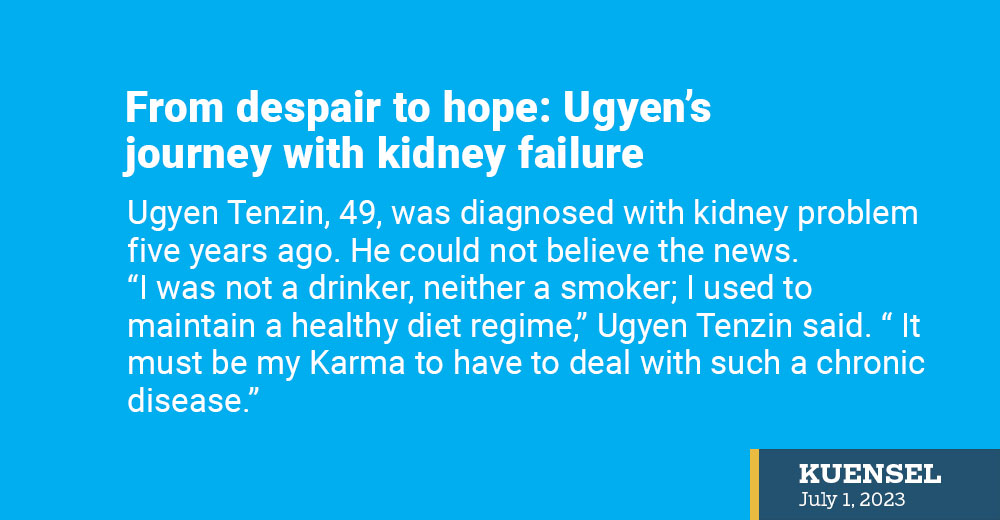Yangyel Lhaden
Ugyen Tenzin, 49, was diagnosed with kidney problem five years ago. He could not believe the news.
“I was not a drinker, neither a smoker; I used to maintain a healthy diet regime,” Ugyen Tenzin said. “ It must be my Karma to have to deal with such a chronic disease.”
Ugyen did not want to burden his wife and four children. “I thought it is better for me to go,” Ugyen said. He did not even go for dialysis. For a person like me, it was sure death.”
Ugyen’s condition worsened. Medications did not work on him anymore. When he got bedridden last year, he said to himself, “Just a little more suffering and I am done.”
But villagers and his friends convinced him to go to Thimphu for medical interventions. So he started dialysis regime in Thimphu. By the by, he came to know about the Bhutan Kidney Foundation (BKF).
Tashi Namgay, the founder of BKF, went through pretty much the same ordeal. After a successful kidney transplant, he knew what he had to do. He started the Foundation. The aim was to educate and advocate the public about kidney health and related problems.
BFK provides social support to needy patients with kidney problems. The Foundation provides monetary support for review and treatment in India for those with kidney problem, including transportation to hospital for dialysis, meal, and academic support.
“While the government provides medical treatment free of cost, there are some patients who are unable to afford personal expenses. That’s where we come in, to complement the government’s effort,” Tashi Namgay said. “Hospitals provide treatment and we provide social support in our small ways.”
Ugyen said that he did not know about the existence of such a support system in the country. “I talked with Tashi Namgay and he was willing to help me. He advised me to take care of myself and informed me about supports that are available.”
Ugyen could not believe how and why Tashi Namgay came to his help.
“I couldn’t really comprehend why someone who I did not know was willing to provide me with options and supports.”
But Ugyen took it all. As time passed, he became more resilient and decided to fight his disease until the end because he saw there were people willing to support him.
Ugyen is a lay monk from Trashiyangtse. He used to support his family by performing rituals. When he became ill with the disease, going for rituals became less frequent and stopped eventually. The household income shrank by the day; his wife now ekes out a living working in their small farm. For the education of his four children, family members took the responsibility in his absence, and borrowed money from here and there.
Now that his eldest daughter has landed a job, financial pressure on the family has greatly reduced.
Ugyen lives alone in the patients’ guesthouse in Mongar. “For people like us, the government has done so much. I am truly indebted.”
Ugyen gets 25 kg rice, cooking oil, and soaps, among others, from BKF.
Last year alone, BKF spent about Nu 700,000 on the patients’ essential needs, Nu 2.8 million on review and treatment in India, Nu 200,000 for transportation, and Nu 38,000 on academic expenses.
The Foundation has supported more than 40 patients for review and treatment in India since 2012.
The Foundation today has under its care 43 beneficiaries from Thimphu, 15 from Mongar, 14 from Gelephu, and three from Paro.
“There are 375 patients on dialysis,” said Tashi Namgay.
If Trashigang has a dialysis centre, it would greatly help the people of eastern dzongkhags. This is what Ugyen hopes for.


